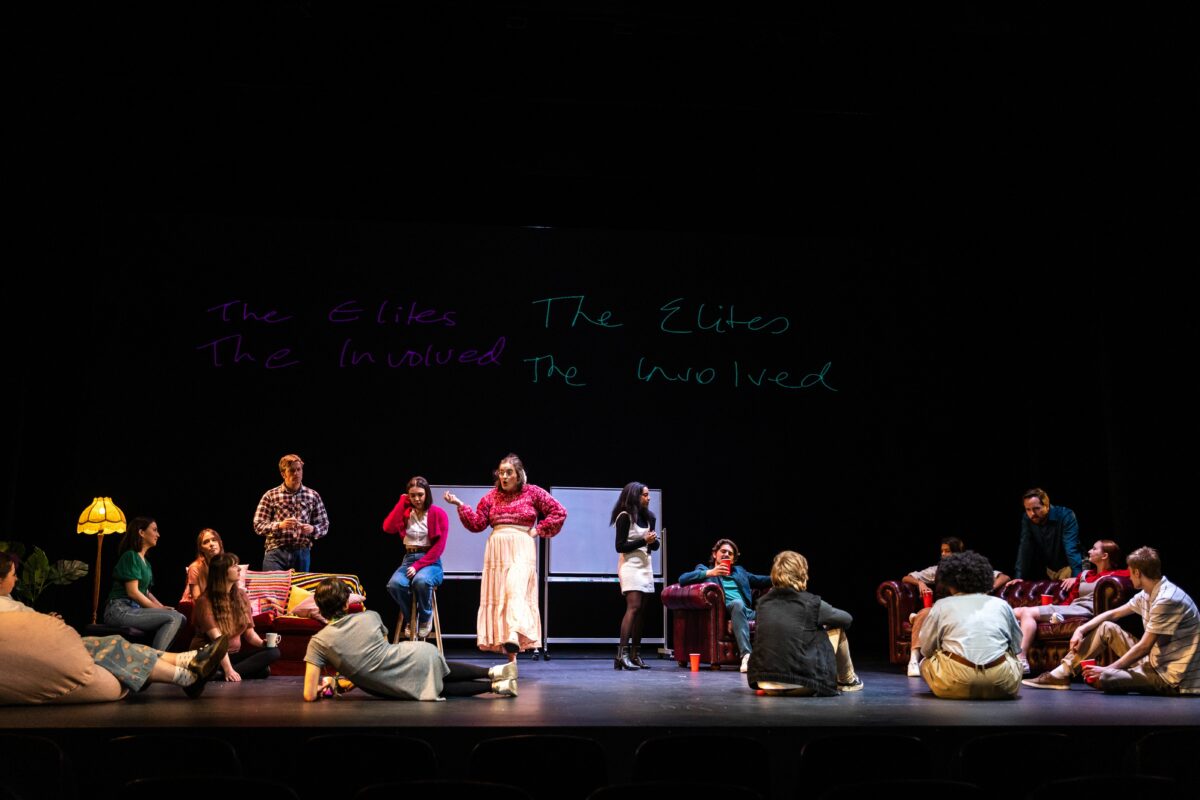I am not sure, even if someone had warned me, that I would ever have been ready to watch Julian Larnach’s How to Vote!. To sit down in front of the Canberra Theatre Playhouse stage and watch a play about student politics, student journalism and student theatre, for someone involved in all three, felt eerily like seeing a dramatized version of the past three weeks of my life. The scene in which the editor of the student paper sweeps in and declares Student Politics season open happened recently at Woroni. The policies emblazoned on the fliers handed out at intermission are topics of discussions in our team meetings; and the minimal set dressing used for the progressive candidate’s campaign headquarters looks suspiciously like my share house living room. All of this, however, pales in comparison with the characters that inhabit those scenes and sets – they are real people, people that would fit right in oversharing in tutorials or haunting Badger on a Tuesday night. I have met these people.
The plot of the play follows the political duel for student union President between energetic theatre-kid and progressive poster child Lizzie (portrayed, in perhaps my favourite performance, by Caitlin Baker) and hard-drinking, narcissistic, BNOC Giles (played suspiciously well by Matt White). All the while, single issue candidate and optimistic first-year Mon (Ella Buckley), who won the audience’s vote and thus the presidency on opening night, tries to get a pothole near her bus stop filled.

However the story is not the main attraction. Rather, it serves as a throughline for the moments of sharp-tongued wit as the play explores, as Luke Rogers’ director’s note puts it, “What happens when the word ‘student’ is placed before things like politics, journalism, and theatre”, which are the real highpoints of the production. Vignettes of big dreams running up against small budgets, and ambition and insecurity getting tangled up in a way all too familiar for those in their early twenties.
Importantly, How to Vote! is also genuinely funny. The play is in command of a broad range of comedic devices from whip-smart one-liners to deftly playing absurd scenarios straight. Along with not shying away from the occasional politically re-written Shakespeare soliloquy or a surprisingly good mime routine. Of course, not everything lands. A joke about drinking piss well overstays its welcome, the work sometimes suffering from a tendency towards over-explanation. Further, the story can get a little lost in its framing device, the whole election being a Machiavellian Honours project set up by previous president Tash (Joanna Richards), which ends up feeling overblown and distracts from the core of the work.

How to Vote! or, the Repercussions of Political Ambition and Personal Rivalries within Student Leadership and Media Organisations in the Context of the post-COVID-19 Neoliberal University Institution, to use its full name, is a rare treat for Australian, and especially Canberran, university students. In a media landscape dominated on the one hand by European ‘classics’ from centuries past and, on the other, by the might of Hollywood and American streaming services, it is uncommon to feel quite so seen or spoken to as is managed by Canberra Youth Theatre’s most recent outing. While How to Vote! is a satire, and as such gets great mileage out of mocking its characters, it is also a love letter to them – to the volatile cocktail of pride, fear, and enthusiasm that so defines undergraduate life. It is a tribute to everyone who’s ever set out to change the world only to discover that it’s a little harder than anticipated. The play’s dazzling variety, keen-eyed observation, and genuine heart are a testament to the creativity and sophistication of everyone involved and to the potential of allowing young people to tell our own stories.
How to Vote! runs until the 10th of September and, for any students who have the chance, go see it – after all, it was literally made for you.
Tickets at: https://canberratheatrecentre.com.au/show/how-to-vote/
Think your name would look good in print? Woroni is always open for submissions. Email write@woroni.com.au with a pitch or draft. You can find more info on submitting here.


We acknowledge the Ngunnawal and Ngambri people, who are the Traditional Custodians of the land on which Woroni, Woroni Radio and Woroni TV are created, edited, published, printed and distributed. We pay our respects to Elders past and present. We acknowledge that the name Woroni was taken from the Wadi Wadi Nation without permission, and we are striving to do better for future reconciliation.
